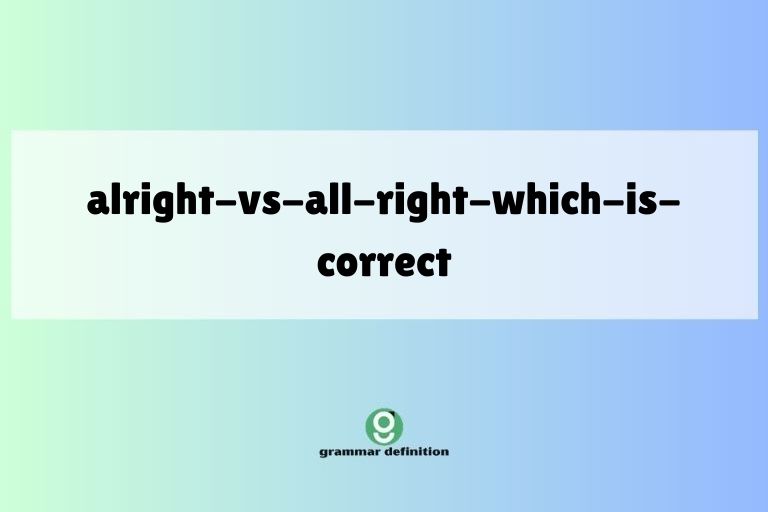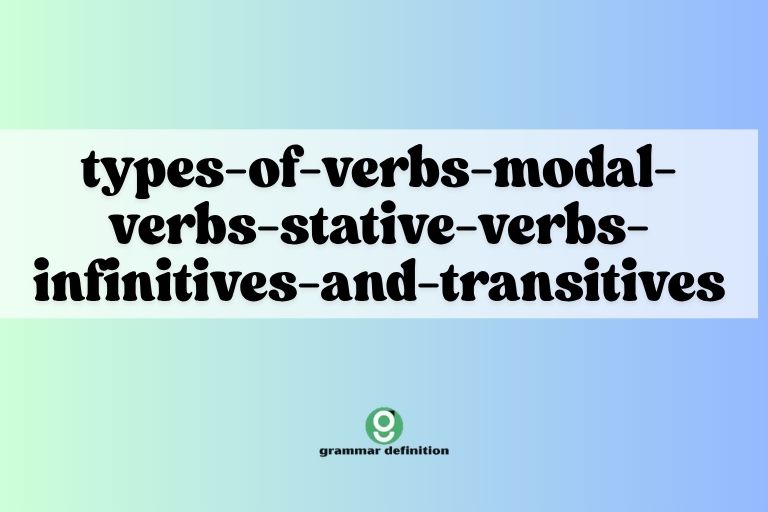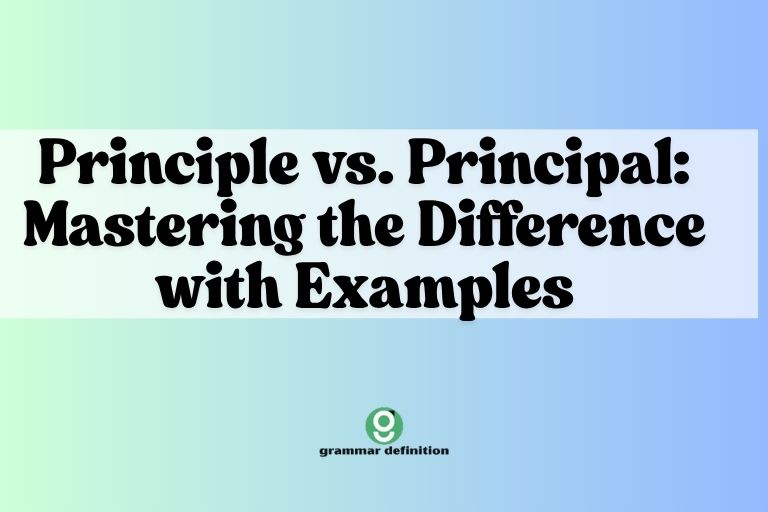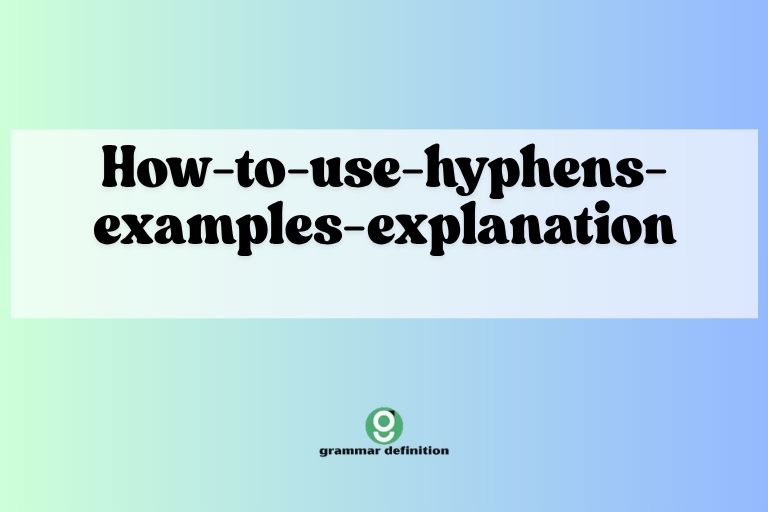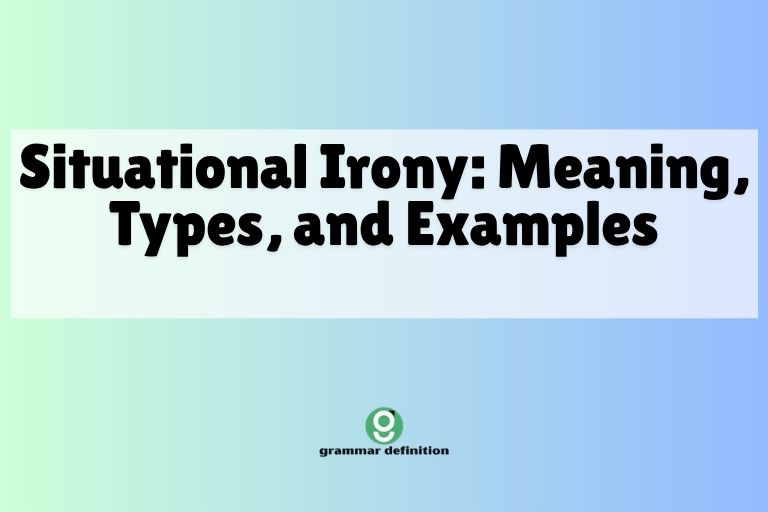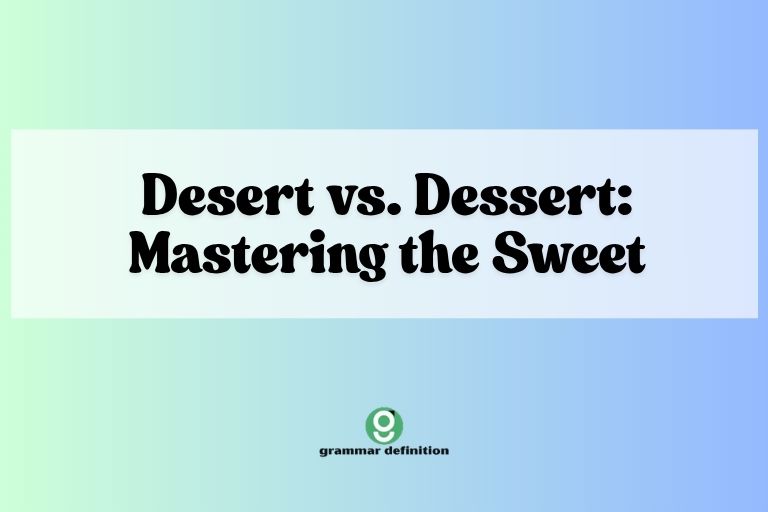Advice vs. Advise: Mastering the Nuances of Guidance
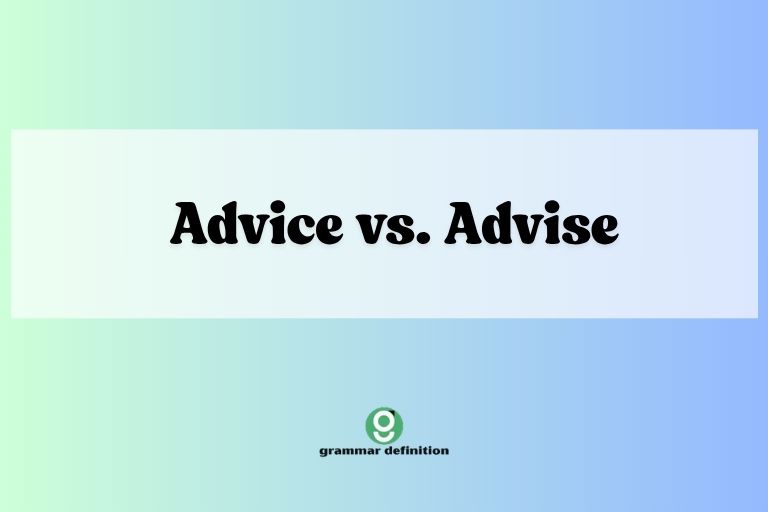
Understanding the difference between “advice” and “advise” is crucial for effective communication in English. These words are often confused because they sound alike, but they have distinct grammatical roles.
Misusing them can lead to confusion and detract from the clarity of your writing and speech. This article provides a comprehensive guide to mastering the usage of “advice” and “advise,” covering definitions, structural breakdowns, examples, common mistakes, and practice exercises.
Whether you’re a student, a professional, or simply someone looking to improve their English skills, this guide will equip you with the knowledge and tools you need to use these words correctly.
Table of Contents
- Introduction
- Definitions: Advice vs. Advise
- Structural Breakdown
- Usage Rules: When to Use Advice and Advise
- Examples: Advice and Advise in Context
- Common Mistakes
- Practice Exercises
- Advanced Topics
- FAQ: Frequently Asked Questions
- Conclusion
Definitions: Advice vs. Advise
The confusion between “advice” and “advise” stems from their similar pronunciation and close relationship in meaning. However, understanding their grammatical roles is key to using them correctly.
“Advice” is a noun, while “advise” is a verb. This fundamental difference dictates how they are used in sentences.
Advice (Noun)
“Advice” is a noun that refers to a recommendation or guidance offered to someone about what they should do. It is an uncountable noun, meaning it cannot be pluralized with a simple “-s.” You cannot say “advices.” To refer to multiple instances of advice, you would use phrases like “pieces of advice” or “some advice.”
Example: “I need some advice on choosing a career path.”
Advise (Verb)
“Advise” is a verb that means to offer suggestions about the best course of action to someone. It involves the act of giving advice.
“Advise” is a regular verb, meaning it follows standard conjugation rules for past tense and past participle forms (advised, advised).
Example: “The doctor advised me to get more rest.”
Structural Breakdown
Understanding the structure of sentences using “advice” and “advise” can further clarify their distinct roles. The noun “advice” typically functions as a subject, object, or complement in a sentence.
The verb “advise” functions as the main verb, indicating the action of giving advice.
Structure of Sentences with “Advice”
When using “advice,” the typical sentence structures include:
- Subject: “The advice was helpful.”
- Object: “I need some advice.”
- Complement: “That’s good advice.”
- With Prepositions: “According to his advice,…”
Structure of Sentences with “Advise”
When using “advise,” the typical sentence structures include:
- Simple Sentence: “I advise you to be careful.”
- With an Object: “She advised him on his investments.”
- Passive Voice: “He was advised to seek professional help.”
Usage Rules: When to Use Advice and Advise
The key to using “advice” and “advise” correctly is to remember their grammatical functions: “advice” is a noun (a thing), and “advise” is a verb (an action).
General Rule
If you’re referring to the recommendation itself, use “advice.” If you’re referring to the act of giving a recommendation, use “advise.”
Using “Advice” Correctly
Remember that “advice” is an uncountable noun. Therefore, you cannot pluralize it by adding “-s.” Instead, use phrases like “a piece of advice,” “some advice,” or “several pieces of advice” to refer to multiple instances of advice.
Examples:
- Correct: “I received some excellent advice from my mentor.”
- Incorrect: “I received some excellent advices from my mentor.”
- Correct: “She gave me a valuable piece of advice.”
Using “Advise” Correctly
“Advise” is a verb and should be used to describe the action of giving suggestions or recommendations. Ensure that you conjugate the verb correctly based on the tense of the sentence.
Examples:
- Present Tense: “I advise you to save money.”
- Past Tense: “He advised her to take the job.”
- Past Participle: “They have advised him against the decision.”
Common Phrases with “Advice” and “Advise”
Familiarizing yourself with common phrases that use “advice” and “advise” can further solidify your understanding of their proper usage.
Phrases with “Advice”:
- Take advice
- Give advice
- Ask for advice
- Follow someone’s advice
- A piece of advice
- Good advice
- Bad advice
Phrases with “Advise”:
- Advise someone to do something
- Advise someone on something
- Be advised that…
Examples: Advice and Advise in Context
The following examples illustrate the correct usage of “advice” and “advise” in various contexts. Pay close attention to the grammatical role each word plays in the sentence.
Examples of “Advice”
The following table presents various examples of using “advice” in sentences. Note how “advice” functions as a noun in each case.
| Sentence | Explanation |
|---|---|
| I need some advice on buying a new car. | “Advice” is the object of the verb “need.” |
| Her advice was invaluable during the crisis. | “Advice” is the subject of the verb “was.” |
| That’s a great piece of advice! | “Advice” is a complement describing “piece.” |
| He ignored my advice and made a mistake. | “Advice” is the object of the verb “ignored.” |
| According to her advice, we should invest in technology. | “Advice” is used with the preposition “according to.” |
| Can you give me some advice about my career? | “Advice” is the object of the verb “give.” |
| The doctor’s advice was to rest and drink plenty of fluids. | “Advice” is the subject of the sentence. |
| I didn’t follow his advice, and now I regret it. | “Advice” is the object of the verb “follow.” |
| She always gives the best advice. | “Advice” is the object of the verb “gives.” |
| Seeking professional advice is often a good idea. | “Advice” is the object of the verb “seeking.” |
| His advice helped me make the right decision. | “Advice” is the subject of the verb “helped.” |
| I value your advice very much. | “Advice” is the object of the verb “value.” |
| She is always willing to offer advice. | “Advice” is the object of the verb “offer.” |
| We should listen to the advice of experts. | “Advice” is the object of the verb “listen.” |
| The lawyer provided valuable advice. | “Advice” is the object of the verb “provided.” |
| Good advice is hard to come by. | “Advice” is the subject of the sentence. |
| He gave me a crucial piece of advice. | “Advice” is part of the phrase “a piece of advice.” |
| I appreciated her thoughtful advice. | “Advice” is the object of the verb “appreciated.” |
| The consultant’s advice proved to be very beneficial. | “Advice” is the subject of the sentence. |
| He sought advice from several experienced professionals. | “Advice” is the object of the verb “sought.” |
| The financial advice he received was tailored to his specific needs. | “Advice” acts as the subject of the sentence. |
| Their advice focused on long-term investment strategies. | “Advice” is the subject of the verb “focused.” |
| Many people seek advice before making significant life changes. | “Advice” is the object of the verb “seek.” |
Examples of “Advise”
The following table presents various examples of using “advise” in sentences. Note how “advise” functions as a verb in each case.
| Sentence | Explanation |
|---|---|
| I advise you to be careful. | “Advise” is the main verb, giving a recommendation. |
| The doctor advised me to get more exercise. | “Advised” is the past tense of “advise.” |
| She advised him on his career options. | “Advised” is the past tense of “advise,” with an object. |
| They advise against traveling during the storm. | “Advise” is the main verb, expressing a warning. |
| He was advised to seek legal counsel. | “Advised” is used in the passive voice. |
| I would advise you to reconsider your decision. | “Advise” is used with a modal verb (“would”). |
| The teacher advised the students to study hard. | “Advised” is the past tense of “advise.” |
| We advise our clients on financial matters. | “Advise” is the main verb, indicating a professional service. |
| The manual advises users to back up their data regularly. | “Advises” is the present tense, third-person singular form. |
| I advise that you arrive early for the meeting. | “Advise” is used with a “that” clause. |
| The consultant advised the company on restructuring. | “Advised” is the past tense of “advise.” |
| She advised me to take a break. | “Advised” is the past tense of “advise.” |
| They advise against making hasty decisions. | “Advise” is the main verb expressing caution. |
| The experts advise caution when dealing with online scams. | “Advise” is the main verb giving a warning. |
| He advised her to be patient. | “Advised” is the past tense of “advise.” |
| I advise him on his investments. | “Advise” shows a professional relationship. |
| The manual advises following the safety guidelines. | “Advises” provides instructions. |
| She advised me to consult a specialist. | “Advised” is the past tense of “advise.” |
| The lawyer advised his client about the legal implications. | “Advised” shows a professional giving counsel. |
| I advise that you seek a second opinion. | “Advise” is used to recommend an action. |
| The travel agency advised against visiting certain regions due to political instability. | “Advised” indicates a caution against travel. |
| The doctor advised maintaining a balanced diet and regular exercise. | “Advised” provides health-related recommendations. |
| The financial advisor advised diversifying investments. | “Advised” is used in a financial context. |
Comparative Examples: Advice vs. Advise
This table highlights the contrast between “advice” and “advise” by presenting pairs of sentences that use each word in a similar context.
| Sentence with “Advice” | Sentence with “Advise” |
|---|---|
| I need some advice on this matter. | I advise you to consider all your options. |
| Her advice was very helpful. | She advised me on the best approach. |
| He ignored my advice. | I advised him not to do that. |
| That’s a good piece of advice. | I advise that you take that into consideration. |
| I value your advice greatly. | I advise you to seek professional help. |
| The expert’s advice was invaluable. | The expert advised us on the new strategy. |
| We followed their advice. | They advised us to proceed with caution. |
| Seeking professional advice is wise. | We advise seeking legal counsel. |
| His advice helped me make the right choice. | He advised me on which path to take. |
| The manual contains useful advice. | The manual advises users to read the instructions carefully. |
| The committee sought advice from various consultants. | The consultants advised the committee on the best course of action. |
| The patient received specific advice regarding medication. | The doctor advised the patient to take the medication as prescribed. |
| The teacher gave helpful advice to the students. | The teacher advised the students to study diligently for the exam. |
| The manager offered practical advice to the team. | The manager advised the team to improve their communication skills. |
| The coach provided strategic advice to the athlete. | The coach advised the athlete on improving their technique. |
Common Mistakes
One of the most frequent errors in English grammar is confusing “advice” and “advise.” This section highlights these common mistakes and provides examples to clarify the correct usage.
Misusing “Advice” and “Advise”
The primary mistake is using “advise” as a noun or “advice” as a verb. This often occurs because of their similar pronunciation.
Correct vs. Incorrect Examples
The following table provides examples of common mistakes and their corrections.
| Incorrect | Correct | Explanation |
|---|---|---|
| I need to advise on this matter. | I need advice on this matter. | “Advise” is a verb; “advice” is the correct noun. |
| She gave me good advise. | She gave me good advice. | “Advise” is a verb; “advice” is the correct noun. |
| He adviced me to be careful. | He advised me to be careful. | “Advised” is the correct past tense form of the verb “advise.” |
| Thanks for your advice. | Thanks for your advice. | Correct usage. |
| I advice you to go home. | I advise you to go home. | “Advise” is the correct verb. |
| They gave me many good advices. | They gave me many good pieces of advice. | “Advice” is uncountable; use “pieces of advice.” |
| The doctor advice me to rest. | The doctor advised me to rest. | “Advise” needs to be in its past tense form: “advised”. |
| For more informations, advice our website. | For more information, advise our website. | “Advise” is the correct verb here, meaning to inform. |
| I am seeking advise from a professional. | I am seeking advice from a professional. | “Advice” is the noun needed here. |
| She is adviceing him on his career path. | She is advising him on his career path. | Correct the spelling of the verb in its present continuous form. |
Practice Exercises
These exercises will help you reinforce your understanding of “advice” and “advise.” Choose the correct word or correct the sentence as needed.
Exercise 1: Choose the Correct Word
Choose the correct word (“advice” or “advise”) to complete each sentence.
| Question | Answer |
|---|---|
| 1. I need some ________ on buying a house. | advice |
| 2. The lawyer ________ his client to remain silent. | advised |
| 3. Her ________ was to invest in technology stocks. | advice |
| 4. I ________ you to think carefully before making a decision. | advise |
| 5. He gave me a valuable piece of ________. | advice |
| 6. They ________ against traveling during the hurricane. | advise |
| 7. I didn’t follow his ________, and I regret it. | advice |
| 8. She ________ me to take a break. | advised |
| 9. Seeking professional ________ is always a good idea. | advice |
| 10. The manual ________ users to back up their data. | advises |
Exercise 2: Fill in the Blanks
Fill in the blanks with the correct form of “advice” or “advise.”
| Question | Answer |
|---|---|
| 1. If you need ________, ask a trusted friend. | advice |
| 2. The counselor ________ students on their career paths. | advises |
| 3. His ________ helped me make the right choice. | advice |
| 4. I would ________ against making such a risky investment. | advise |
| 5. She offered helpful ________ to her colleagues. | advice |
| 6. The doctor ________ her to quit smoking. | advised |
| 7. They sought ________ from a financial expert. | advice |
| 8. I ________ you to consult a lawyer. | advise |
| 9. That’s the best ________ I’ve ever received. | advice |
| 10. He ________ me on the importance of saving money. | advised |
Exercise 3: Sentence Correction
Correct the following sentences that contain errors in the use of “advice” and “advise.”
| Incorrect Sentence | Correct Sentence |
|---|---|
| 1. I need to advise from you on this problem. | I need advice from you on this problem. |
| 2. She gave me some good advises. | She gave me some good pieces of advice. |
| 3. He adviced me to be patient. | He advised me to be patient. |
| 4. Thanks for your advise. | Thanks for your advice. |
| 5. I advice you to think twice. | I advise you to think twice. |
| 6. The teacher gave us many advices. | The teacher gave us many pieces of advice. |
| 7. They are seeking advise from a specialist. | They are seeking advice from a specialist. |
| 8. I am adviseing him on his investments. | I am advising him on his investments. |
| 9. The book provides helpful adviced. | The book provides helpful advice. |
| 10. He is always willing to advise his friends. | He is always willing to advise his friends. |
Advanced Topics
For advanced learners, understanding the nuances of formal vs. informal language and the subtleties in meaning can further refine their usage of “advice” and “advise.”
Formal vs. Informal Usage
In formal writing, it’s essential to maintain grammatical accuracy and clarity. While both “advice” and “advise” are appropriate in formal contexts, pay close attention to sentence structure and word choice.
In informal settings, such as casual conversations, some grammatical rules may be relaxed. However, it’s still important to use “advice” and “advise” correctly to avoid confusion.
Nuances in Meaning
While “advice” and “advise” are generally used to offer guidance, the specific meaning can vary depending on the context. “Advice” can range from simple suggestions to expert recommendations.
“Advise” can imply a formal consultation or a friendly suggestion.
Consider the following examples:
- “I sought legal advice from a lawyer.” (implies a formal consultation)
- “He advised me to take a different route.” (implies a friendly suggestion)
FAQ: Frequently Asked Questions
Here are some frequently asked questions about “advice” and “advise,” along with detailed answers to clarify any remaining confusion.
- Q: How do I remember the difference between “advice” and “advise?”
A: A helpful mnemonic is to remember that “advice” is a noun, like an object you can hold, and “advise” is a verb, an action you perform. Think of “ice” for advice (noun) and visualize “s” for advise (verb) as the start of an action word.
- Q: Can “advice” ever be plural?
A: No, “advice” is an uncountable noun and does not have a plural form with an “-s.” To refer to multiple instances of advice, use phrases like “pieces of advice” or “some advice.”
- Q: Is it ever correct to use “adviced?”
A: No, “adviced” is not a word. The past tense and past participle of “advise” are both “advised.”
- Q: What are some common phrases that use “advice” and “advise?”
A: Common phrases with “advice” include “take advice,” “give advice,” and “a piece of advice.” Common phrases with “advise” include “advise someone to do something” and “be advised that.”
- Q: Why is it important to use “advice” and “advise” correctly?
A: Using these words correctly ensures clarity in communication. Misusing them can lead to confusion and can undermine your credibility, especially in professional settings.
- Q: How can I improve my usage of “advice” and “advise?”
A: Practice is key. Try writing sentences using both words in different contexts. Pay attention to how they are used in books, articles, and other written materials. Additionally, consider asking a friend or teacher to review your writing and provide feedback.
- Q: What is the difference between “advice” and “counsel”?
A: While both involve guidance, “counsel” often implies more formal or professional advice, such as legal or psychological counsel. “Advice” is a more general term that can apply to everyday situations.
- Q: Can “advise” be used in a sentence without a direct object?
A: Yes, “advise” can be used intransitively, although it’s less common. For example, “I advise caution” implies that the speaker is giving a general warning without directly advising a specific person.
Conclusion
Mastering the difference between “advice” and “advise” is essential for clear and effective communication in English. Remember that “advice” is a noun, referring to the recommendation itself, while “advise” is a verb, describing the act of giving a recommendation.
By understanding their grammatical roles, studying examples, and practicing their usage, you can avoid common mistakes and confidently use these words in your writing and speech. Continue to practice and refine your understanding to further enhance your English language skills.

